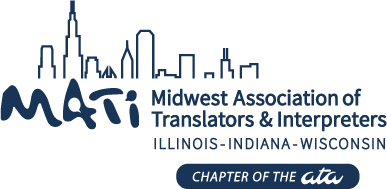By Maha El-Metwally
Acoustic shock can have very serious implications for interpreters but we are not paying enough attention to it. This issue gained more awareness in the context of remote interpreting but also in the context of colleagues who got acoustic shock while working in Canada, Paris and other places. As interpreters, we need to educate ourselves about what is an acoustic shock.
Let’s start with a definition. There are several definitions out there and one of the definitions is: "exposure to a sudden, loud, shocking or startling noises, usually in one ear, which may subsequently develop into painful symptoms"(1). Acoustic shock can have many symptoms. It could have physical symptoms like headaches, tinnitus, nausea, hyperacusis, muffled hearing, and vertigo. Other symptoms include numbness or burning sensations around the ear. If the symptoms persist, it could even lead to psychological symptoms including post-traumatic stress disorder, anxiety and even depression.
So what can you do in order to protect yourself against an acoustic shock and against its consequences? You could start by purchasing a limiter. Limiters are not widely spread in the world of interpreting but they are widely used in the world of TV and the music industry. They are small pieces of equipment that act as a middleman between your headphone and your console or computer. They inhibit any sudden surge in sound from reaching dangerous levels. The manufacturers calibrate the limiters to suit the make and model of your own headphones. You may want to check brands like AdaptEar or LimitEar.
There are some consoles that have built-in limiters. It is good practice to ask questions about the equipment you are asked to use when you work in a meeting. Conference technicians would be able to tell you more information about the equipment. Being educated about the equipment that we are using is a good idea. There are also headphones with built in limiters. They may not offer 100% protection against acoustic shock but they go part of the way. The brands and specifications are in the link to Naomi Bowman’s article at the end of this article.
Some colleagues suffered an acoustic shock and they had to go through a long treatment. During the treatment period, they could not work. At the risk of stating the obvious, our hearing is essential to our livelihoods as interpreters. You may want to look at an occupational accident insurance. There are types that could cover any periods of unemployment that you may have as a result of an occupational accident and acoustic shock may qualify as one. This way, if you suffer an acoustic shock, you do not suffer a loss of income.
Our busy lives involve a lot of air travel and some types of aeroplanes can be very noisy. Using noise-cancelling headphones when travelling can help protect your ears. It is also a good idea to have regular hearing checks as we may not be aware that our hearing is deteriorating.
When we do in-person interpreting, we often rely on others to ensure that the equipment functions properly. However, under the current circumstances when we have to work from home, we need to take responsibility for that part as it is not feasible for somebody else to do that for us.
Footnotes:
1. https://www.bc-legal.co.uk/bcdn/502-226-acoustic-shock-an-update
Resources:
Naomi Bowman’s article on how to choose a headset: https://www.linkedin.com/pulse/how-choose-headset-rsi-remote-simultaneous-naomi-bowman/?trackingId=qZtuMWfcZjNG8%2FiDYFIsAQ%3D%3D
Cyril Flerov’s article on decibels:
https://www.linkedin.com/pulse/what-every-interpreter-must-know-decibels-cyril-flerov/
Maha El-Metwally is a conference interpreter for the languages: Arabic (A), English (B), French and Dutch (C). She works for a wide range of international organizations, including the European Institutions and the United Nations. She is a member of the International Association of Conference Interpreters (AIIC), the Chartered Institute of Linguists (CIoL) and the American Translators Association (ATA) where she serves on the Leadership Council of the Interpreting Division. She is also a Board member and member of the Admissions Committee of the Institute of Translation and Interpreting (ITI) where she was recently made fellow.
Maha has an MA in interpreter training from the University of Geneva. She is associated with a number of universities both in the UK and abroad where she contributes to the curriculum. She is passionate about technology in the field of interpreting and offers courses on the subject internationally.
